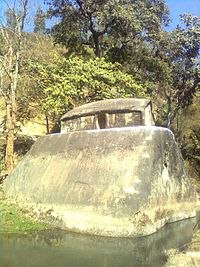Dima Hasao is a rural area in the central region of Assam, India.
Understand
edit


Because of its isolation and lack of amenities, a trip to the district, while rewarding, is somewhat adventurous. That said, the Hills are a place of breathtaking beauty. The Dimasa people have a long history in the hills, which were the heartland of their ancient kingdom. The region also has villages of Zemi Naga, Hrangkhol, Hmar, Kuki, and Biate tribal people. Each group has unique traditions and proud culture. While the isolation of the region has helped preserve these traditions, it also means a lack of development.
The northern area of the hills is less rugged, with rice cultivation in the many river valleys. The southern area is more scenic.
Towns
edit- Haflong — Spilling down from a hilltop, it provides wonderful views of the nearby Borail Mountains. There is also a district museum with some interesting exhibits. The market provides many agricultural products brought in from the countryside, and should certainly be visited. Near the market is a shop selling hand-woven fabrics which is wonderful for picking up inexpensive and lovely souvenirs.
- Jatinga — The nearby village of Jatinga is popularly known as the place where multiple species of birds mysteriously "commit suicide", peaking at the end of the monsoon. Ornithologists have since found that the birds don't commit suicide but are killed by becoming disoriented during the dark, foggy and windy night sky. The birds are attracted to the lights of the cities and are hit with bamboo poles by villagers believing that spirits from the sky are terrorising them. Despite this, the suicide myth is still popularly believed.
- Langting — A commercial centre. There is an evening market that is busy and fascinating.
- Maibang — An ancient capital of the Dimasa people. The Stone House near the river is the only intact relic of the kingdom there, though other artefacts have been discovered during construction and are on display.
Talk
editIndigenous languages of the various tribal groups are most common. In the towns, many speak Hindi, Assamese, or English as a second language.
Get in
editThere is a daily commercial bus service from Guwahati and Shillong.
There are regular train services from the nearby Northeast Indian hubs of Guwahati, Silchar and Agartala. The area can be reached by train from Guwahati, with a transfer in Lumding. A scenic local train to Silchar has stops in Langting and Haflong Hill.
Get around
editThree-wheeled taxis are ubiquitous in the towns: always make sure of your destination and fare before getting in. Inter-town transport is available in buses and "Sumos," large jeeps that often carry ten or more passengers in a quite crowded cab.
See
edit
Go to the very top of the hill in Haflong for a marvellous view of the Borail Range to the west of the town. Wander down from there into the market to see what might be available. Go to the Circuit House for a view of the Jatinga River.
- Haflong Lake. Nestled in the forests and mountains, the lake is particularly beautiful after the rainy season.
Do
editHiking through the countryside would prove a treat for nature lovers. It would be unwise to do this without a local guide.
- Chavang Kut. The Kuki ethnic group in Haflong celebrate Chavang Kut, the rice harvest festival, on the 1st of November every year wearing traditional attire and performing vivid dances.
Eat
edit- 1 Hangover Cafe, Circuit House, Haflong East, ☏ +91 91017 76006. Mixed Indian cuisine. Better non-veg options than veg.
Drink
editThe Dimasa are proud of their traditional dju, a rice beer.
Sleep
editMany hotels and guest houses are available in Haflong and other towns of Dima Hasao.
- The Landmark Hotel, Member’s Council Hostel Road East, ☏ +91 3673 239 009. Complimentary breakfast. Many rooms have views of the lake. ₹2,500-4,500 per night depending on the quality of the room.
- Haflong Hotel, Hagjer Nagar.
- Nathao Lodge, Dibarai.
Stay safe
editThere has been a history of inter-tribal violence in the area. There are also a number of violent liberation groups. Obviously, it is good to check a knowledgeable travel agent for local conditions. Because of the violence, there is a heavy police and paramilitary presence in parts of the area. It is probably unwise to travel in the region without a local guide.
